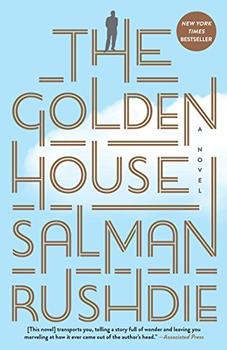Summary | Excerpt | Reading Guide | Reviews | Beyond the Book | Readalikes | Genres & Themes | Author Bio

A Novel
by Salman Rushdie
He came to the city like one of those fallen European monarchs, heads of discontinued houses who still used as last names the grand honorifics, of-Greece or of-Yugoslavia or of-Italy, and who treated the mournful prefix, ex-, as if it didn't exist. He wasn't ex-anything, his manner said; he was majestic in all things, in his stiff-collared shirts, his cufflinks, his bespoke English shoes, his way of walking toward closed doors without slowing down, knowing they would open for him; also in his suspicious nature, owing to which he held daily separate meetings with his sons to ask them what their brothers were saying about him; and in his cars, his liking for gaming tables, his unreturnable Ping-Pong serve, his fondness for prostitutes, whiskey, and deviled eggs, and his often repeated dictum—one favored by absolute rulers from Caesar to Haile Selassie—that the only virtue worth caring about was loyalty. He changed his cellphone frequently, gave the number to almost no one, and didn't answer it when it rang. He refused to allow journalists or photographers into his home but there were two men in his regular poker circle who were often there, silver-haired lotharios usually seen wearing tan leather jackets and brightly striped cravats, who were widely suspected of having murdered their rich wives, although in one case no charges had been made and in the other, they hadn't stuck.
Regarding his own missing wife he was silent. In his house of many photographs, whose walls and mantelpieces were populated by rock stars, Nobel laureates, and aristocrats, there was no image of Mrs. Golden, or whatever she had called herself. Clearly some disgrace was being implied, and we gossiped, to our shame, about what that might have been, imagining the scale and brazenness of her infidelities, conjuring her up as some sort of most high-born nymphomaniac, her sex life more flagrant than any movie star's, her divagations known to one and all except to her husband, whose eyes, blinded by love, continued to gaze adoringly upon her as he believed her to be, the loving and chaste wife of his dreams, until the terrible day when his friends told him the truth, they came in numbers to tell him, and how he raged!, how he abused them!, calling them liars and traitors, it took seven men to hold him and prevent him from doing harm to those who had forced him to face reality, and then finally he did face it, he accepted it, he banished her from his life and forbade her ever again to look upon her sons. Wicked woman, we said to one another, thinking ourselves worldly-wise, and the tale satisfied us, and we left it there, being in truth more preoccupied by our own stuff, and only interested in the affairs of N. J. Golden up to a certain point. We turned away, and got on with our lives.
How wrong we were.
2
What is a good life? What is its opposite? These are questions to which no two men will give the same answers. In these our cowardly times, we deny the grandeur of the Universal, and assert and glorify our local Bigotries, and so we cannot agree on much. In these our degenerate times, men bent on nothing but vainglory and personal gain—hollow, bombastic men for whom nothing is off-limits if it advances their petty cause—will claim to be great leaders and benefactors, acting in the common good, and calling all who oppose them liars, envious, little people, stupid people, stiffs, and, in a precise reversal of the truth, dishonest and corrupt. We are so divided, so hostile to one another, so driven by sanctimony and scorn, so lost in cynicism, that we call our pomposity idealism, so disenchanted with our rulers, so willing to jeer at the institutions of our state, that the very word goodness has been emptied of meaning and needs, perhaps, to be set aside for a time, like all the other poisoned words, spirituality, for example, final solution, for example, and (at least when applied to skyscrapers and fried potatoes) freedom.
Excerpted from The Golden House by Salman Rushdie. Copyright © 2017 by Salman Rushdie. Excerpted by permission of Random House. All rights reserved. No part of this excerpt may be reproduced or reprinted without permission in writing from the publisher.




Idealism increases in direct proportion to one's distance from the problem.
Click Here to find out who said this, as well as discovering other famous literary quotes!
Your guide toexceptional books
BookBrowse seeks out and recommends the best in contemporary fiction and nonfiction—books that not only engage and entertain but also deepen our understanding of ourselves and the world around us.